Latest episode
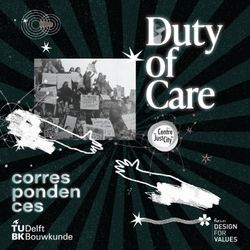
2. Making Space for Care: Reflections from the BK Feminist Week
01:02:02||Season 5, Ep. 2What does it mean to build a system of care inside spaces not built for it? In this episode, we had a conversation with Irene Luque Martin, Emmelot Linssen, Megha Sahu, Jonne van Bunningen and Isabella Jaramillo, five voices from within the university reflecting on the making of the Feminist Week and other actions as an experiment in horizontal leadership, collective organising, and creating care and safe spaces. The episode explores care as a radical practice, the friction of institutional life, and the power of doing things differently together, and highlight key takeaways from the event’s impact so that you can also take it further wherever it is your sphere of action.This episode is dedicated to the BK Feminist Week, an event held between the 3rd and the 7th of March 2025 at TU Delft. The week was planned with lectures, workshops, and events to generate discussions, and the assembly's internal events to give space for the organisational team and “the village” to discuss ways of organising for the near future. The theme of the week this year was called Pasts, Present and Futures as a way to understand the plurality of stories from the past, to converge all together in the present at the faculty, but also to build desires and ideas for the future.
More episodes
View all episodes
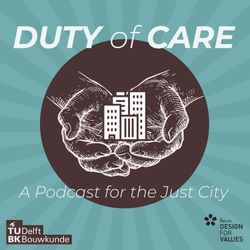
4. Vanesa Castán Broto on "The Twin Challenges of Climate Action and Rapid Urbanisation"
38:53||Season 4, Ep. 4On this episode, we have Professor Vanesa Castan Broto from the University of Sheffield in the UK. Vanesa is a scholar on the governance of global environmental change in the urbanisation age. Her previous books include An Urban Politics of Climate Change and the edited collection Participatory Planning for Climate Compatible Development in Maputo. Both are unmissable books! She was also a contributing author to UN-Habitat's 2016 World Cities Report. In 2016, she received the Philip Leverhulme Prize for contributions to Geography. In 2013, she received a United Nations Award for Lighthouse Activities that contribute to fighting climate change with a focus on the urban poor. Vanesa’s research focuses on the governance of global environmental change in the urbanization age. She focuses on three interrelated themes: 1) the governance of climate change in urban areas, 2) urbanization and the dynamics of energy transitions, and 3) barriers to the implementation of climate change action.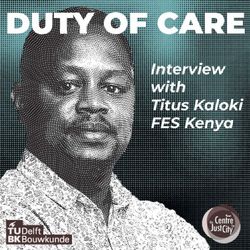
1. Just City in Kenia: a conversation with Titus Kaloki
55:37||Season 5, Ep. 1Roberto Rocco and Hugo Lopez interview Titus Kaloki on addressing spatial justice through inclusive urban planning. The episode has three main topics: (1) Smart City vs Just City, (2) The idea of transformative change-making, and (3) the work for a socially just public transport.Titus Kaloki is Programme Coordinator at FES _the Friedrich Ebert Stitftung for Social Democracy_ Kenya Office, where he leads the Just City programme, which engages the concept of a social and inclusive just city to facilitate innovative discussions among political decision makers, civil society representatives and others on issues such as affordable housing, fair and clean public transport, and meaningful civic engagement in urban spaces.FES is the oldest political foundation in Germany with a rich tradition in social democracy dating back to its birth in 1925. The foundation owes its formation and its mission to the political legacy of its namesake Friedrich Ebert, the first democratically elected German President. The work of FES focuses on the core ideas and values of social democracy – freedom, justice and solidarity. FES is a non-profit institution that organises their work autonomously and independently.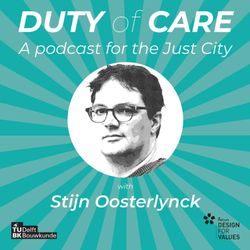
3. "Planning for Solidarity in Diversity" with Stijn Oosterlynck
50:08||Season 2, Ep. 3Today we have with us Stijn Oosterlynck speaking from Belgium. Stijn Oosterlynck is an Associate Professor in Urban Sociology at the University of Antwerp, Sociology department. He is the chair of the Centre for Research on Environmental and Social Change (CRESC, formerly OASeS) and the Antwerp Urban Studies Institute. He teaches courses on urban studies, poverty and social inequality. His research is concerned with local social innovation and welfare state restructuring, new forms of solidarity in diversity and urban diversity policies. He is also the academic director of the newly established Hannah Arendt institute. Hannah Arendt advocated active citizenship in which plurality, connection, critical thinking and open dialogue are central. This is not only at the heart of a strong democracy, but it is also an important goal of the work of the institute: to make everyone participate in the debate and in society.
2. "Democracy and human rights in the field of planning" with Efrat Cohen-Bar
27:00||Season 2, Ep. 2Today we have with us Efrat Cohen Bar, a representative of BIMKOM – Planners for Planning Rights, an Israeli non-profit organization working to strengthen democracy and human rights in the field of planning. Planning in Israel has commonly been used as a tool to oppress Palestinians and strip them of their rights. BIMKOM uses Israeli law to combat this. https://bimkom.org/eng/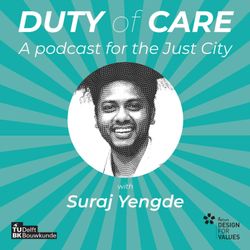
4. "Race & Space: Issues of race and class in urban development" with Suraj Yengde
27:48||Season 2, Ep. 4Today we have with us Suraj Yengde speaking to us from the United States. Suraj is a Shorenstein Centre inaugural post-doctoral fellow at the Harvard Kennedy School of Public Policy. He’s the author of Caste Matters. In this explosive book, Suraj, who is a first-generation Dalit scholar educated across continents, challenges deep-seated beliefs about caste and unpacks its many layers.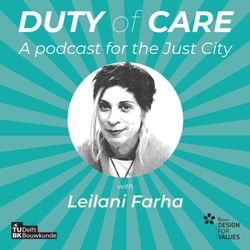
1. "Housing as a Human Right" with Leilani Farha
27:26||Season 2, Ep. 1Today we have with us Leilani Farha, speaking to us from Canada. Leilani was UN special rapporteur for the right to housing and is now director of SHIFT, a large NGO based in Canada that fights for and promotes the right to dignified housing. Leilani will talk more about the SHIFT, but it is important to highlight their philosophy. In their own words: “THE SHIFT recognizes housing as a human right, not a commodity or an extractive industry. The Shift restores the understanding of housing as home, challenging the ways financial actors undermine the right to housing. Using a human rights framework, The Shift provokes action to end homelessness, unaffordability, and evictions globally”. https://www.make-the-shift.org